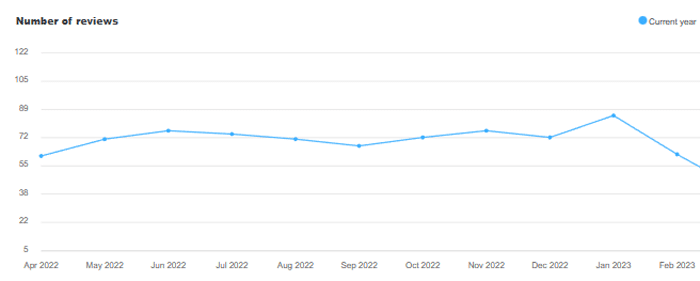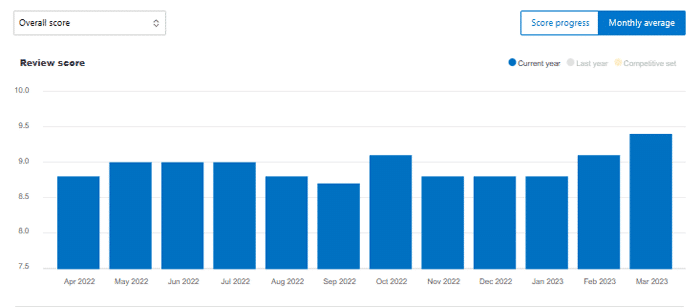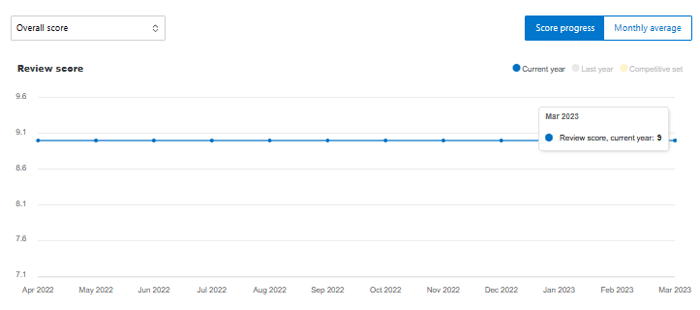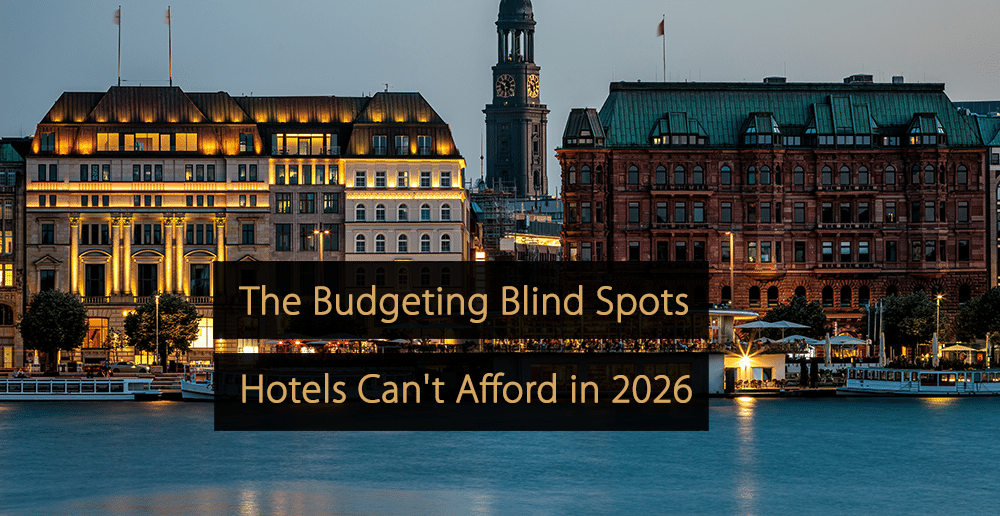What do hoteliers resist about revenue management? One common pushback is lowering prices below a certain psychological threshold. Yet, it’s essential during low demand and pays off later.
Some hoteliers believe: “I cannot sell below a certain figure because otherwise low-quality guests will arrive and lower the hotel’s image; I prefer to stay empty and not sell.”
Yet, those who practice revenue management know it’s the opposite. During low season, you can sell your rooms competitively and maintain a positive hotel image. When you have a high-value property and guests enjoy a competitive rate, their experience translates into a high value-for-money ratio. Then, they leave you a positive review, and your property enjoys an excellent online brand reputation.
This excellent brand reputation boosts your property’s online visibility, which often translates into higher dollars per room later in the season.
The Truth About Room Rates and Guests
Let’s dive into this common thinking in more detail.
Some hoteliers fear low rates will attract low-quality guests. In their minds, such guests may damage the room or behave rudely to other guests. Those other guests may have paid a higher rate and have different expectations than these so-called low-quality guests. The fear is such guests will damage the image and reputation of the hotel.
However, there’s a problem with this line of thinking.
The problem is it’s impossible to determine a room rate that only attracts low-quality guests vs. a rate that only attracts polite and respectful guests. These are subjective perceptions that have no scientific evidence.
On the other side, you may attract entitled guests who pay a lot during the high season. Such guests may ignore the smoking prohibited signs and smoke in their rooms. Or, they may abuse the heating or air-conditioning or make scenes at reception due to dissatisfaction.
Some hoteliers turn a blind eye to rude customers if they’ve paid a perceived high rate. Yet, if the rates are low, they point fingers at the guest quality and trigger the automatic assumption that low price = low-quality guest.
“The truth is the guest quality depends on their character and not the rate they paid.”
What Really Matters is the Hotel’s Online Reputation
Guests choose a hotel based on its online reputation. Thus, the guest comments define the hotel’s quality in future customers’ minds.
Considering that perspective, you can see that the fear of low prices attracting low-quality guests is misleading and unjustified.
But what about higher prices?
Hoteliers are also terrified of selling at prices that are too high. Like low rates, this is a subjective fear that the rooms aren’t worth the charge, and the consequence will be dissatisfied guests who leave negative reviews and lower the hotel’s online score.
In either case, these are subjective fears. What is the price point (either on the low or the high end) where you’ll only attract negative reviews? Is it 59 Euro, 79, or 399 Euro?)
Don’t let subjective fears set your rack (or bottom) rate.
Revenue managers find the data to make useful pricing projections and suggestions rooted in science.
Yes, a 3-Star Hotel Can Sell a Room for 1000 Euros
If you are a 3-star hotel and the market or a super event allows you to sell for 1,000 euros, there is no point in refusing to do so for fear of a bad review.
Of course, there are chances that a guest will leave a negative review. They may perceive the room as a low value for money. But lowering prices far below the market’s willingness to spend makes no sense. If anything, we need to analyze why that negative review arrives.
Maybe that negative review had nothing to do with the price but with something that went wrong during the stay and was made even more bitter by the price.
For example, imagine if the guest paid a thousand euros, but the photos and descriptions did not match reality, the rooms were old and rundown, the bathroom did not work, or the staff was rude. In such a case, they’ll likely leave 4 out of 10 or 1 in 5 on Tripadvisor, Booking, or other review portals.
However, if the guest paid a thousand euros and the stay was impeccable and beyond expectations? That experience will likely turn into 10 out of 10 or 5 out of 5 on the same portals.
As always, everything is subjective, and the high price is the logical consequence of a very high demand, and it’s only one of the elements in the reputation equation.
If a guest leaves a negative review, take note of their complaints and reinvest the extra money in solving the problems.
If the rooms seem worn out, then reinvest in a refurbishment. If the beds are uncomfortable, then invest in new mattresses. If the staff is rude, invest in training.
“In short, hotels should reinvest additional money to improve the service instead of lowering prices and limiting potential gains.”
Your Property’s Online Reputation Score Counts
Your online reputation score uses the average of your reviews to assign the score. Since these reviews accumulate for years, they cover all seasons and unusual events. Collecting many positive reviews during the low season balances out any blows received during the high season or events.
There are more statistical chances your property’s score will drop during high season when rates peak. However, it’s also true that in the natural and cyclical alternation of seasons and periods, the positive reviews in the low season will overcome any negative ones.
In mathematical terms, you create the conditions for the volume of positive reviews to exceed the negative ones. That way, the global average is always stable or going upward. However, achieving those positive reviews is only possible if you invest time and energy in monitoring reviews and money in correcting defects and improving the hotel’s service.
Below is a 3-star hotel’s dashboard graphic over the past 12 months. In transparency, this Milan-based hotel is a Franco Grasso’s Revenue Team customer. The occupancy has always been close to 100% throughout the year. But the most significant fluctuations in ADR (Average Daily Revenue) correspond with some months (particularly June and September) and particular dates within these months. These fluctuations are due to major events that generate significant demand volumes in the area.
Below you’ll see more reviews than others in some months. Some of those negative are linked to price trends, yet the number of positive reviews accumulated during the previous and following months keeps the hotel’s reputation strong.
You can see below the overall Booking.com score remained stable (9) throughout the year. Their visibility remains high and contributes to bookings, occupancy, and ADR.
Below is a graph showing the average over time of all the reviews received in the last three years.
The results were much better in 2022 than in 2019 in terms of both Occupancy and ADR
Why were the results better in 2022? They were better because this hotel used revenue management practices to boost its online visibility and overall annual revenue.
Take the bottom rate and the rack rate. These represent the minimum sales rate (below which you do not fall) and the maximum sales rate (above which you do not sell). There are economic reasons (variable costs, for example, read this article for more information) in the case of the bottom rate. Yet, there are times when the market will accept a higher rack rate.
Free Ebook: 10 Things To Know About Revenue Management
This ebook is an introduction to revenue management for executives, general managers and hotel owners. Within the ebook “10 Things To Know About Revenue Management”, you’ll learn the principals of revenue management. Click here to download the Guide "10 Things To Know About Revenue Management".
Revenue management ensures science drives room rates and not emotions. As hoteliers, who are we to prevent guests from booking 3-star rooms for 1,000 euros per night if they feel it is right? Reputation, timing, and location count a lot.
More Tips to Grow Your Business
Revfine.com is the leading knowledge platform for the hospitality and travel industry. Professionals use our insights, strategies, and actionable tips to get inspired, optimize revenue, innovate processes, and improve customer experience.Explore expert advice on management, marketing, revenue management, operations, software, and technology in our dedicated Hotel, Hospitality, and Travel & Tourism categories.














Leave A Comment